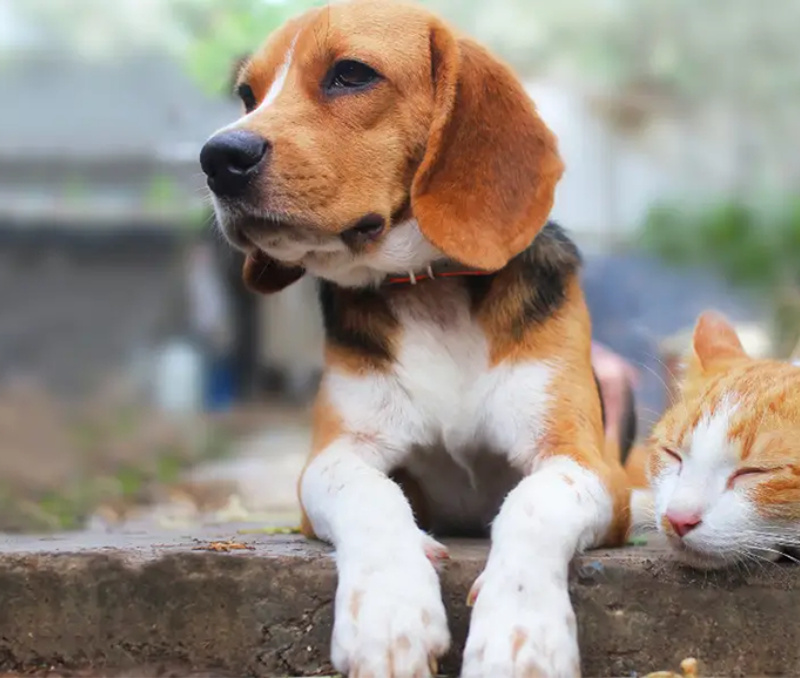
Caring for an Elderly Dog
Caring for a senior cat involves providing comfort and support and maintaining a stable routine to ensure their final years are as peaceful as possible. At home, you can create a calm environment by offering cozy resting spots, easy access to food and water, and assisting with grooming when needed. Pay close attention to changes in behavior, appetite, or mobility, as these may indicate discomfort or pain. Offering consistent affection and gentle care can help reduce anxiety during this stage of your cat’s life.
Additionally, regular vet visits are essential to monitor your cat’s health and address any emerging health issues. Aging cats are more prone to chronic conditions such as arthritis, kidney disease, and dental problems, so early detection is key for alleviating discomfort and allowing your cat to age gracefully. Your veterinarian can guide you in making compassionate decisions for your cat’s care during this delicate time.

Caring for an Elderly Dog
As dogs enter their senior years, they require special attention and care to maintain their quality of life. Regular veterinary check-ups become increasingly important with age to monitor their health and catch any age-related issues early. These visits allow your vet to assess your dog's overall condition, adjust medications if needed, and provide guidance on nutrition and exercise tailored to your pet's changing needs.
At home, focus on creating a comfortable environment for your elderly dog. Provide soft bedding in easily accessible areas, consider using ramps or stairs to help them navigate furniture, and ensure they have non-slip surfaces to walk on. Most importantly, shower your aging companion with love and patience as they navigate this stage of life.
Supporting Your Senior Cat's Well-Being
Caring for a senior cat involves providing comfort and support and maintaining a stable routine to ensure their final years are as peaceful as possible. At home, you can create a calm environment by offering cozy resting spots, easy access to food and water, and assisting with grooming when needed. Pay close attention to changes in behavior, appetite, or mobility, as these may indicate discomfort or pain. Offering consistent affection and gentle care can help reduce anxiety during this stage of your cat’s life.
Additionally, regular vet visits are essential to monitor your cat’s health and address any emerging health issues. Aging cats are more prone to chronic conditions such as arthritis, kidney disease, and dental problems, so early detection is key for alleviating discomfort and allowing your cat to age gracefully. Your veterinarian can guide you in making compassionate decisions for your cat’s care during this delicate time.
When to Consider Euthanasia
Deciding whether to consider euthanasia for a sick cat is deeply personal and depends on a range of factors, including your cat’s age, breed, overall health, and quality of life. Every situation is unique, as no two cats or families are the same. At West Chester Veterinary Care, we recognize the emotional gravity of this decision and are dedicated to supporting you through this challenging time. We offer compassionate guidance and help you assess your cat’s well-being, ensuring you make the most informed choice for your cherished companion.
If you have questions about your cat’s health or need help exploring care options for your pet, we encourage you to schedule a consultation with our team. During this time, we can provide clarity on your pet’s condition, discuss available options, and walk you through every step of this difficult process with sensitivity and understanding.
Pet Cremation and Burial
Saying goodbye to your beloved pet is a deeply emotional experience, and our team offers compassionate support in making end-of-life arrangements. We provide options for both pet cremation and burial, guiding you through the process with sensitivity and respect for your wishes. Our team is here to help you choose a meaningful way to honor your pet's memory.
Coping With Pet Loss
We understand that coping with pet loss is an incredibly personal and challenging situation. Here are some tips to help you through this difficult time:- Allow yourself to grieve: Recognize that your feelings of sadness and loss are valid. Give yourself permission to mourn, and don't rush the process.
- Memorialize your pet: Create a tribute to your pet through a photo album, planting a tree, or holding a small ceremony. This can help provide closure and celebrate your pet's life.
- Seek support: Reach out to friends, family, or support groups who understand pet loss. Sharing your feelings can be therapeutic.
- Maintain routines: Try to stick to your normal schedule as much as possible. This can provide a sense of stability during an emotional time.
- Practice self-care: Ensure you're eating well, getting enough sleep, and exercising. Taking care of yourself physically can help you cope emotionally.
- Consider professional help: If you're struggling to manage your grief, don't hesitate to speak with a counselor or therapist who specializes in pet loss.
Remember, healing takes time, and it's okay to miss your pet. Each person's grief journey is unique, so be patient and kind to yourself as you navigate this loss.
For More Information:
Looking for End-of-Life Services for Cats in Pennsylvania?


Looking for End-of-Life Services for Cats in Pennsylvania?
At Leo’s Pet Care, we aim to keep your pets healthy. We recommend routine pet examinations, vaccinations, and more to give your pets the best chance at a healthy and long life.
Compassionate Care for Your Cat: Book an Appointment Today
At West Chester Veterinary Care, we’re dedicated to providing exceptional care for cats at every life stage. Schedule a visit with our caring team, and let us support you and your pet through end-of-life care.
Our Location
Our Location
We Love Your Pets at WCVC!
Hours of Operation
Monday - Friday: 7:30 a.m. - 6:00 p.m.
Saturday - Sunday: Closed
Doctor Hours By Appointment Only
